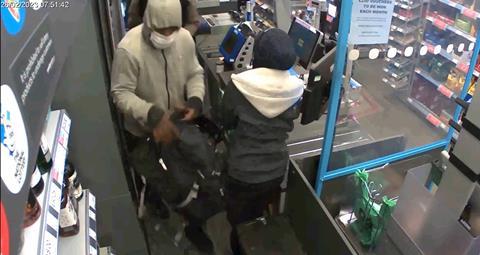Co-op has collaborated with professor of criminology Emmeline Taylor on the strategy
Violence and abuse continues to grow in retail, with incidents rising by 50% to 1,300 a day, according to new BRC figures this week, covering 2022/23.
Co-op alone suffered over a third of a million incidents in 2023, making it a record year for theft and violence against its staff, according to the retailer’s own latest crime report.
As it published its figures last week, Co-op set out a 10-point plan for turning the tide on offenders, in a report authored by University of London professor of criminology Emmeline Taylor.
So what are the retailer’s 10 recommendations?
1. Make a plan
As obvious as it seems, police & crime commissioners need to develop a strategy, says the report. Their plans should “address the multiple and interconnected elements of retail crime, including theft, violence and anti-social behaviour”.
2. Set some KPIs
The police last year made new commitments, including prioritising attendance where violence is involved or a suspect has been detained, under the Retail Crime Action Plan.
All well and good, but “we don’t really know how each force is doing and they have different levels of offending”, says Taylor. “We need another iteration [of the plan] that allows forces to benchmark their data.”
The plan needs to be more measurable, so KPIs can be set, says the report.
3. Introduce a crime ‘retail flag’
One unmeasurable aspect of the plan is police attendance to violent crimes in a retail environment, since the Police National Database does not distinguish shops from other settings.
Adding a ‘retail flag’ to the database would
If a shop worker is assaulted while at work, it’s not currently possible to distinguish if it occurred in a retail setting as opposed to any other location. This makes it difficult to identify and aggregate cases that represent crimes against the sector.
In conjunction with the KPIs, a ‘retail flag’ would not only monitor changes in frequency of crimes but bring “greater visibility around violent attacks against shopworkers”, says Taylor.
Read more:
-
Violence and abuse in retail stores rose 50% in 2023, says BRC
-
Co-op reports record levels of theft and violence in 2023
-
Prison food reform is ‘huge opportunity’ for wholesalers, says charity
-
Trade bodies welcome crime bill amendment to protect shopworkers
It would also enable the Ministry of Justice to know whether laws making attacking a shopworker an aggravated offence are being applied when sentencing, says the report.
The added advantage would subsequently help to identify when and how Section 156 of the Police, Crime, Sentencing and Courts Act 2022 is used, which makes it an aggravated offence to attack a shopworker.
ACS CEO James Lowman says: “Currently, there is a particular challenge around how the aggravating factor is being taken into account in sentencing decisions. There is no systemic way of finding out how much it has been used or if it’s having impact. That’s why there is this ongoing conversation about introducing a standalone offence to be a further deterrent and ensure appropriate sentencing.”
4. Target the stolen goods market
As Co-op campaign and public affairs director Paul Gerrard says: “We’ve always focussed on the shoplifting incident, but what happens to the products they steal?”
According to the report, it is not uncommon for prolific offenders to identify small independent businesses in the vicinity, such as convenience stores, cafés, pubs and restaurants, that will purchase stolen goods to sell on for profit. That’s an offence that can hold up to seven years in prison, says Taylor.
A campaign is needed to “better educate and highlight to independent businesses the risk of buying stolen products”, says Taylor. Those businesses may include c-stores, pubs and restaurants, unaware the risk is up to seven years in prison.
This could be through poster campaigns, police spot checks in stores, or using trackers to build evidence of larger-scale operations.
With more awareness and police action, “we suddenly start to disrupt those markets”, says Taylor. And equally, as Co-op’s Gerrard says: “If you make it harder to sell product, then you’re not going to steal as much. Tackling it from both ends is really important.”
5. Introduce a specialist court
Intensive Supervision Courts aim to use community sentencing to tackle the root causes of offenders’ behaviour, including requiring them to attend regular review meetings.
There should be a specialist supervision court for retail crime, says the report, “to identify the underlying factors driving prolific local offenders and ensure that intense treatment interventions and links to wider support services are tailored to offenders’ needs”.
Taylor says: “Organised criminals obviously need to feel the full weight of the law, but for individuals that are stealing to fund a drug addiction, prison won’t solve the problem.” says Taylor.
“They need to be put on community orders where rehabilitation is mandatory and supervised. Magistrates will get to know those individual cases and find out what is and isn’t working.”
She adds: “Shoplifters often have very complex needs, such as mental health issues, drug addiction, or are homeless, yet they’re given inappropriate sentences that do nothing to address the root causes of their offending.”
Craig MacKenzie, a partner and head of the crime division at Forbes Solicitors says, however, it’s a case of “putting the cart before the horse” with specialist problem solving courts.
“The criminal justice system is not in a good place,” he says. “It’s back-logged, broken, and in many respects, no longer fit for purpose.
“These courts would need someone from drug and alcohol support, mental health, housing, benefits and financial advice, which are all areas that have had funding cuts by government in the past.
“The government needs to properly fund the police, the courts and the various support services before doing anything else.”
6. Avoid prison sentences under six months
Short custodial sentences “are particularly ineffective because they can remove any prosocial factors in an offender’s life and are not long enough to begin any meaningful programmes or rehabilitation work, the report explains.
“That does just do more harm than good”, says Taylor. Offenders are “churned out of the system and are worse off when they come out so they just end up stealing again.”

Replacing short custodial sentences with a community order including treatment requirements, or a suspended sentence, could be more effective.
MacKenzie agrees this “revolving door” effect can encourage reoffending.
“They’ll come out of prison with no accommodation, no benefits, and will have to steal just to survive. But magistrates and judges already bend over backwards to avoid imposing short custodial sentences.”
7. Repeal section 176
Section 176 of the Anti-social Behaviour, Crime & Policing Act 2014 made shoplifting up to £200 worth of goods a summary offence, only triable in magistrates’ court.
Thieves claim they can steal up to the threshold with relative impunity, says the report.
8. E-commerce clampdown
There is also the matter of stolen goods being sold through various e-commerce sites and online community marketplaces, which tend to lack verifiable information from the seller. “It’s an important part of the picture – and an under-researched one,” says ACS’s Lowman. Taylor recommends new regulations for online marketplaces making it harder for stolen goods to be sold anonymously. It could include a requirement for sites to collect, verify and disclose identifying information about high-volume third-party sellers.
9. Introduce a standalone offence
A standalone offence of assaulting, threatening, or abusing a retail worker, similar to Scotland’s Protection of Workers Act, which came into effect in 2021, would give shopworkers across the whole of the UK the legal protection they deserve, says the report.
10. Put someone in charge
With all the activity at local and national level, government should appoint an independent advisor to co-ordinate efforts and support improvement in the justice system’s response to retail crime “in all its manifestations”.

























No comments yet